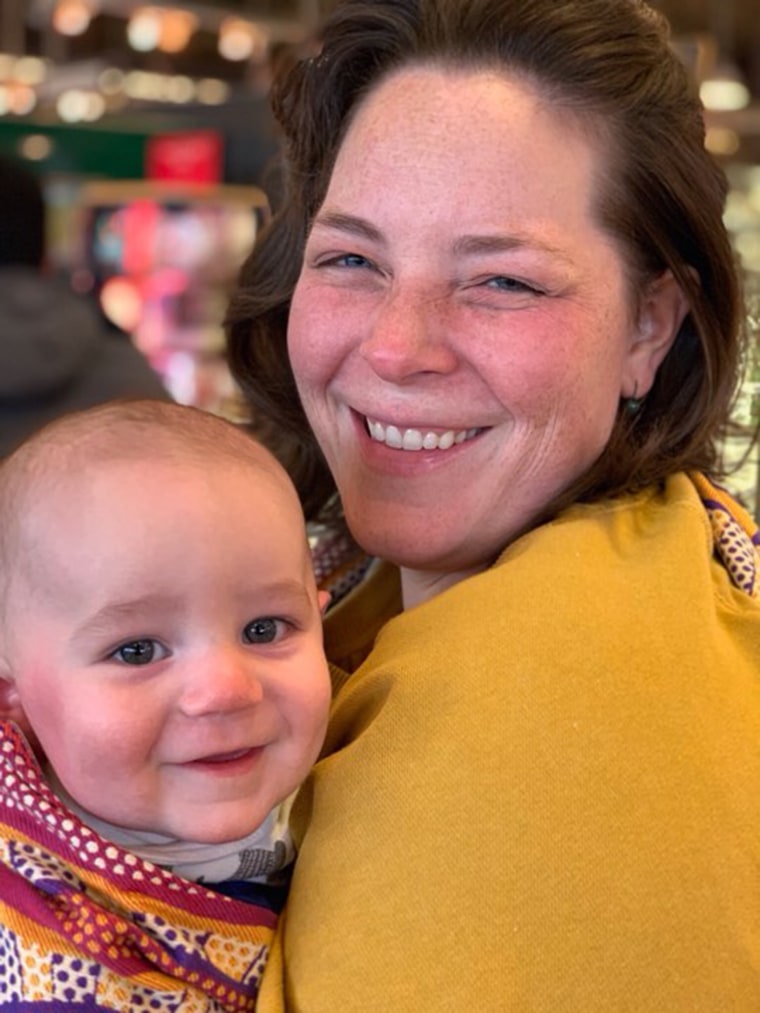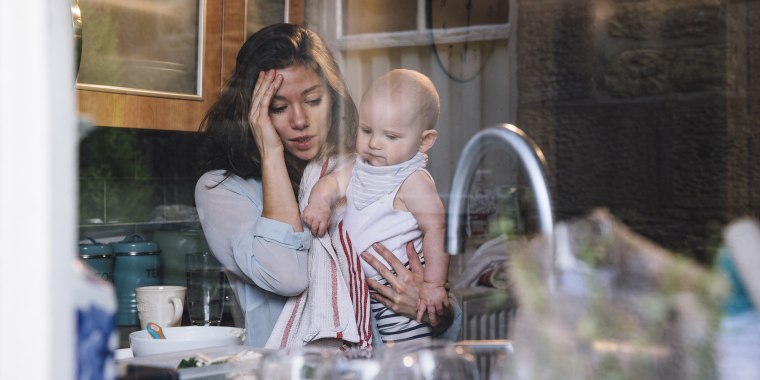A few months after Annie Ranttila gave birth to her son, Arthur, she began having intrusive thoughts. She angered easily and cried a lot. Then the panic attacks started.
"It was paralyzing because I was in my own head. I felt like I had to be in control with everything that had to do with my son," Ranttila, 35, an architect in Pittsburgh, told TODAY. "I was having heart palpitations, racing heart beat, dizziness, I wasn’t able to sleep. I was thinking it was something wrong physically."
Ranttila has postpartum anxiety. But she did not experience symptoms immediately after Arthur's birth in August 2018. When she was screened at her postpartum doctor's appointment, her answers did not indicate she was struggling. But after a few health scares with Arthur (who is fine now), she started feeling scary thoughts and symptoms she never before experienced.
"I hadn't suffered from a mood disorder previously. I didn't know what it was," she said.

Ranttila is not alone. About 15 percent of moms experience postpartum anxiety (with 50% of them having postpartum depression along with it). Yet, many remain unaware that postpartum anxiety occurs.
"(Postpartum) anxiety is not talked about," Dr. Priya Gopalan, chief of psychiatry at UPMC Magee-Womens Hospital in Pittsburgh, told TODAY Parents. “Disordered anxiety is when it goes beyond normal day-to-day stress and anxiety and there is a problem with the pregnancy, mother-baby bonding and the family unit."
What is postpartum anxiety?
“Anxiety in general is really really common. We know that one in four people meet overall criteria for an anxiety disorder. Pregnancy can be a period where this can really present itself,” Gopalan said.
Postpartum anxiety works in the same way that anxiety does but it starts either in the final trimester of pregnancy or up to a year after having a baby.
Postpartum anxiety symptoms
According to Postpartum Support International, symptoms include:
- Nonstop worry
- Feeling that something bad will happen
- Uncontrollable thoughts
- Sleep and eating problems
- Inability to relax
- Dizziness
- Upset stomach
- Hot flashes
“It’s worry, concern, feeling ruminative, where you can’t stop,” Thea Gallagher, clinic director at the Center for Treatment and Study of Anxiety in the Perelman School of Medicine at the University of Pennsylvania, told TODAY. “It’s fear activation and worry and concern even about things you know are obsessive.”
About two months after Jenni Taller's first daughter was born, she knew something was wrong. She had a terrible nightmare where a hideous monster was dangling her baby out of a window and she worried all the time. But 15 years ago, no one talked about postpartum anxiety so she coped alone. She channeled her feelings into a strict schedule that she couldn't break. If a baby book said babies ate every three hours, her daughter ate every three hours.
"I started perpetuating super strict boundaries. I sat on the Internet debating on the bottles to buy and then freaked out because she didn’t take the bottle," Taller, 43, a plant geneticist in Indianapolis, told TODAY.
Her midwife told her she was just experiencing the baby blues and told her not to worry. But that didn't help. It wasn't until another mom in a baby group mentioned postpartum anxiety that something clicked.
"That was exactly where I was at," she said.
Sadly, Taller's experience is common. So many moms feel nervous that some don't realize what they are experiencing is anxiety.
“It is harder to recognize. Of course, women are anxious and stressed — they have a newborn and are not sleeping," Gopalan said. "The lack of awareness is the biggest barrier."
Treating postpartum anxiety.
The experts recommend that moms who think they have postpartum anxiety seek help. A combination of cognitive behavior therapy and medication effectively treats it.
“Anxiety responds to behavioral intervention. If you are worried that your baby is going to get sick if you leave the house then the treatment is leaving the house,” Gallagher explained.
Doctors also prescribe antidepressant medications, such as SSRIs, to help treat anxiety. While many mothers worry about taking drugs while pregnant or breastfeeding, these medications don't harm the baby.
“They are 100 percent safe to use,” Gopalan said.
But the risk of untreated anxiety can have an impact on mom and baby. People with untreated anxiety are more likely to smoke and abuse alcohol and tobacco, for example. And anxiety can prevent them from bonding with their babies.
“Anxious moms are not going to be able to enjoy their babies in the way they want to,” Gopalan said.
Taller agreed:
"It took the edge off everything. I started enjoying my kids," she said.
Many women avoid asking for help because they feel guilty. But the experts agree seeking help will make things easier.
"It is treatable. This is something women don't have to deal with (alone)," Gopalan said.
